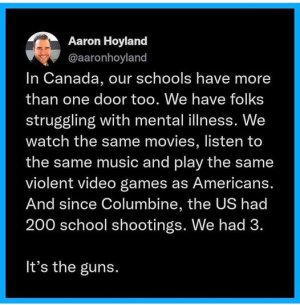When we talk about mental health, it is important not to use it as an excuse. The vast majority of people with mental health issues do not commit such crimes, and most of the shooters do not belong to a demographic that has the least access to mental healthcare. (Black women traditionally have the least access to mental healthcare.) The shooters do, however, belong to a demographic that has traditionally been told they can have the life they want, or a good life, easier life, and our country increasingly fails to provide opportunities, connection, community, support, avenues for improvement, etc for these young people. This makes these young men susceptible to being radicalized because they will turn to people who seem sympathetic on the surface, and will look for reasons for this cultural (and government) failure.
Despair is suffering without hope and many young people do not have hope. We all suffer according to our own personal limits. (For example, someone who has it easier doesn't fail to suffer because others have a bigger struggle. It's all relative.) On top of this, most young people feel angst, anger, high emotions, and a sense that they are different and don't belong.
I think the reason this perspective is passable is because mental illness is being WAY over diagnosed to the point where people who have normal situational depression after a breakup or loved one dying are pathologizing normal human emotions.
If you subtract these mild "mental illness" diagnoses from the mixture which is probably like 60% of people who do not actually have a mental illness, the people remaining are very, very, very sick.
I do not think mental illness is being used as an excuse it is actually a very legitimate reason.
Antecdotally, I have a friend with diagnosed schizophrenia who could definitely hurt another person and I wouldn't hold him accountable for it like I would hold a mentally sound person. He genuinely believes people who are possessed with demons are following him and trying to kill him. He's had times where he thinks other people are just subconscious manifestations of his own mind, and therefore talks to other people like he is talking to himself. He has jumped off roofs thinking he can fly during psychotic episodes.
I don't think we can fairly hold mentally ill people responsible for their actions taken. They are a danger to themselves and others.
The only reason there is even confusion about this is that mental illness has been so normalized that everybody and their grandma has social anxiety and depression.... The type of mental illness that results in severe violence to others usually has psychotic elements like bipolar and schizophrenia and it's no joke. My friend couldn't control himself even if he wanted to. He's currently running around the country trying to escape his father who is trying to institutionalize him for his and other people's own safety, and my friend is focused on trying to get assisted suicide because he no longer wants to live. If you understand that this is what mentally ill is and you still don't think that is a legitimate excuse for why somebody would act in extremely violent and harmful ways I don't know what else to say?? If I had serious delusions, I would act to protect myself, too. And might harm innocent people in the process of my own psychosis. And there is no way to hold a psychotic person responsible for their actions because they are literally not living in reality.
Edit:
Wanted to add this info I found demonstrating that though I may have strong feelings firsthand about witnessing psychosis Asa is being factually accurate that only a small percent of shooters are suffering psychosis during the act:
"
Mass shootings are often blamed on serious mental illness. This study assesses the role of psychosis in contributing to mass shootings along a continuum. The role of psychosis is compared with other motivations for mass shootings including employment issues, interpersonal conflict, relationship issues, hate, and fame-seeking.
Perpetrators motivated by psychosis are also compared with other perpetrators on several well-established risk factors for violence. It is hypothesized that a mental health history is common among mass shooters, but symptoms of psychosis only directly motivate mass shootings for a minority of cases. A dataset of 172 mass shooters was created, coded on 166 life history variables using publicly available data. The entire dataset and codebook are publicly available.
The findings show that symptoms of psychosis played no role in 69% of cases, but psychosis may have played a minor role in 11% of cases, a moderate role in 9% of cases, and a major role in 11% of cases. Perpetrators motivated by psychosis were similar to mass shooters with other motivations in terms of demographics and common risk factors for violence. The role of serious mental illness in mass shootings is complex. The data indicate that access to mental health care may help prevent mass shootings in a minority of cases, but this is far from the only solution to mass shootings.
(PsycInfo Database Record (c) 2021 APA, all rights reserved)"



